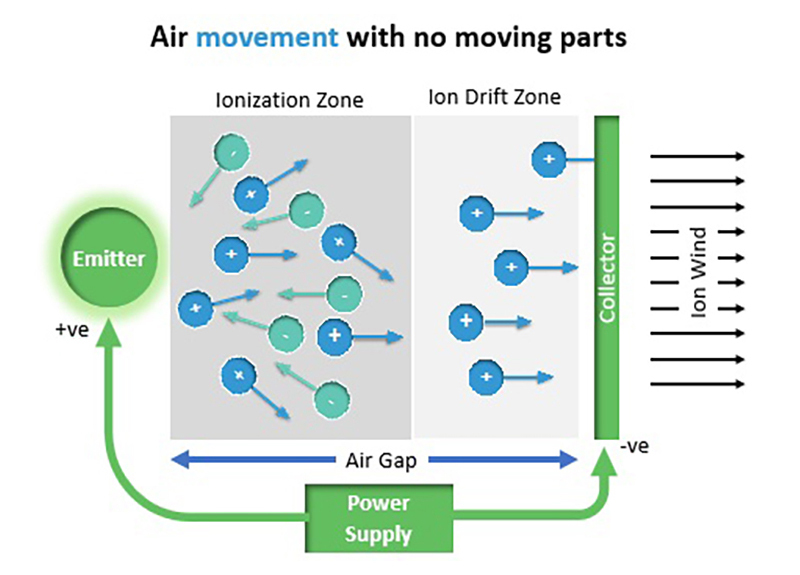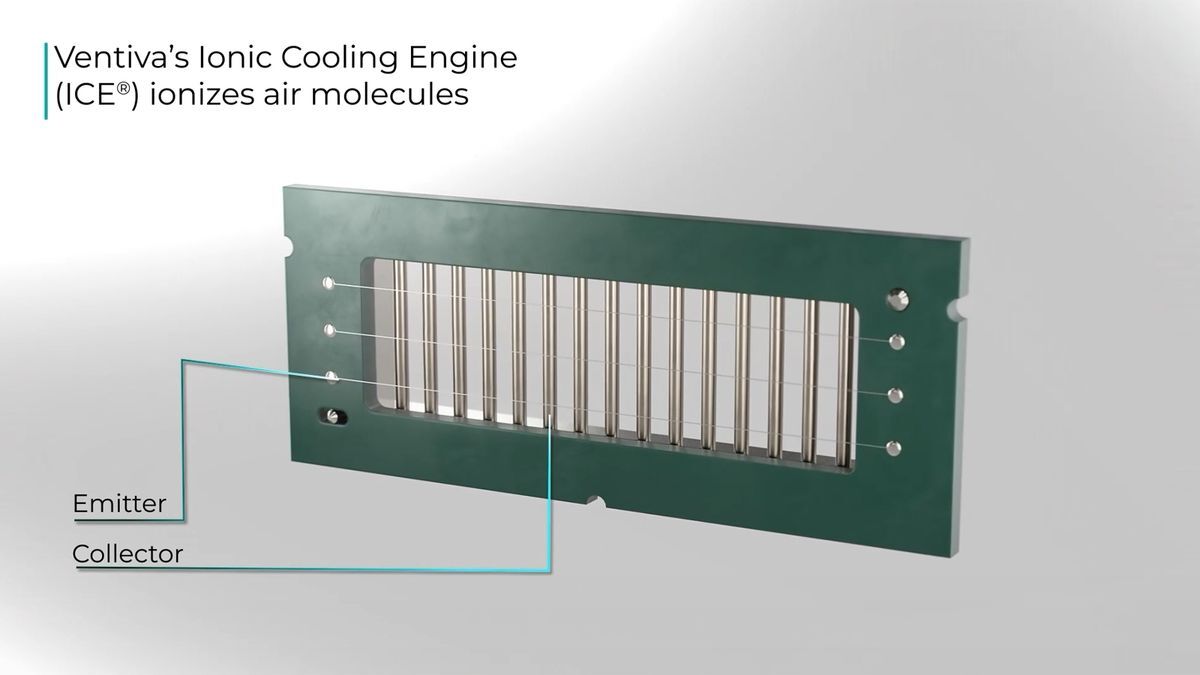Device uses movement of ions to generate airflow without any moving parts like in iPads and MacBook Air.
Counterpoint: stop trying to make laptops thinner and implement realistic and functional air cooling
Passive cooling is generally better for reliability if you can make it work, since all active airflow systems will degrade as dust and hair works into the airflow paths.
Plus, the two can be used in combination. Improved passive cooling systems will make active cooling better by reducing the need to run the active system all the time, or at least run it at reduced rates, which will make the whole system last longer and reduce maintenance.
But this system still makes airflow right? Just without moving parts.
deleted by creator
Make the chassis out of aluminium so the whole bastard is a heatsink.
Slaps roof of laptop This bastard can cook so many egg omelettes
Two eggs and one sausage
Apple has been doing that for years
My laptop and older phone has this and it really does help with the added surface area.
The only issue is if you go full throttle, the section right above the CPU can fry your hand lol.
Although I only ever reached that temp doing stupid crap like hashing.
They already do. My thinkpad T14s is incredibly thin, and it can dissipate
40040 watts of power. My P1 dissipates 160+ watts and it’s also very thin.T14s
You mean 40W? Can’t imagine a T config that’d do 400.
Yes, single zero. 400w would indeed be VERY impressive.
This bad boy can do so much
cryptoAI
Well there’s no shortage of those, and they’re unusually cheaper too (unless they’re specced out). I prefer a thin silent one myself, so I welcome this innovation.
Speaking from experience here, and limited information from the company, this looks like a polished version of a high-voltage grid accelerator.
https://ventiva.com/how-it-works/
What can be an expected concern is that besides ionizing air and imparting motion to neutral air molecules as the ionized ones rush from one plate to the other, that same effect can and will charge dust particles. That “collector plate” will need to be easily accessible.

Appreciate the link. I’ve got a hand-me-down Ionic in my house, and knowing that I can skip running it for basically the same effect means I can save a couple of cents on my electricity bill.
Gonna take another look at those IKEA tables with the HEPA filters built in. Those seem handy to avoid having to dust so often.
Sure thing, glad to be of some kinda help. Ozone can be a good irritant, never mind charged dust sticking to stuff it ordinarily wouldn’t.
I hope this company has a trick for dust control, but I’m expecting that’d be tougher than figuring out the ionic wind part.
They do have a solution for the ozone and dust problems. See this video at about the 9 minute mark:
https://youtu.be/fyai_kUYhLs?t=539
tl;dw: they’re using a cataylist to convert the ozone. There’s a lack of specifics on the dust issue, but they apparently have thought about it and have something there.
One other issue is that the static pressure is abysmal. You can work around that, but it’s not a drop in thing.
Ionic acceleration of air needs high voltages and the air gets ionized (the reason people recommend against vacuuming a PC). I’m surprised that it works at all in close proximity to sensible tech.
Edit: right, low static pressure, meaning: lower voltages. But still not low.
They use a grounded faraday cage around it. Video on it where he touched on that https://youtu.be/fyai_kUYhLs
Can’t watch the video rn, anything about the dust problem?
He just mentions they have a solution but it’s patented so they wouldn’t talk about it. Take that as you will of course
Strange, patented means it should be findable on the USPTO system, diagrams and all. And yet…
Either there’s a filter or the plates will cycle charging up to repeal the dust partials.
the reason people recommend against vacuuming a PC
A regular vacuum isn’t doing anything with ions or high voltages. Moving air can generate potentially harmful static electricity, but usually the reason people recommend against vacuuming a PC is because if you spin the fans doing that, the motors inside turn into generators and drive current back into your PC parts that could damage them.
Moving air can generate potentially harmful static
Well, and what do you think creates that static electricity? Ionization.
Feeding back electricity, that’s why motors usually have a diode or something.
The difference between a vacuum and this fanless cooling device is that a vacuum happens to generate a small amount of static, and usually has grounding wires in the hose to prevent it shocking things, while this fanless device is intentionally ionizing as much air as possible to get it to move.
Exactly, that’s why i’m wondering how it is save.
Not a fan
That’s correct.
It Fannot. Or it Fan’t.
Defanned
I think Dave2D made a video about those. He was cautiously optimistic.
Yes.
Doesn’t an ionic air moving system like this put out a big ass EM field?
Im a fabricator who don’t fuck with the lecky, but maybe someone more educated than me can explain why this doesn’t wipe your memory every time the cooling kicks on
The “fan” sits inside a faraday cage.
I want to put one in a Valve Steamdeck.
Nintendo Switch would be more compelling.
It would be a good use case; however, you can only do so much with a cut down version of a SOC that was originally made in 2015. It may be work for very little gains.
Is this the same way those bladeless Dyson fans work?
Bladeless Dyson’s have the fans hidden, as far as I know. But they still have a bladed fan in there.
Yes but they generate more airflow than the fan alone can
I recently watched some YouTube video that debunked that claim. They are basically pointless.
Edit: https://www.youtube.com/watch?v=ySSo5PmZZJM
It actually works better when You take the inner fan out of the casing. So they are actually a scam.
Not a dyson
Not a proper test, air volume not measured - only speed. The point is to not have fast air so this only confirms the concept works
Are you a Dyson salesman? Watch the video.
I sat through the whole ass thing
They do not. For a given power input they produce less airflow at lower velocity than a regular fan. They’re a complete scam.
Citation needed
You made a claim first, so you should provide your citation first as well.
https://electronics.howstuffworks.com/gadgets/home/dyson-bladeless-fan.htm
Air surrounding the edges of the fan will also begin to flow in the direction of the breeze. This process is called entrainment. Through inducement and entrainment, Dyson claims its fans increase the output of airflow by 15 times the amount it takes in through the pedestal’s motor.
Advertising for a product isn’t a citation. That article literally just repeats Dyson’s own claims. Do you have anything that actually tests that claim?
They’re “bladeless” fans are just regular fans with more steps. Those added steps introduce inefficiencies. Simple as that. If you wanted to make a fan more efficient, you could add a shroud close to the blades, but the energy cost of electric fans are already low enough that it really doesn’t matter.
They literally generate as much as that small fan in the case can generate.
With the aerodynamics of the case it’s just a matter of converting higher pressure into lower pressure with higher (& a bit more laminated) airflow.
I think you are talking about the Coandă effect.
I believe it’s called entrainment which is different?
They aren’t actually bladeless. The fan is just hidden in the base.
Those things have a fan with blades, just stuck in the base.
More like those Ionic Breeze air purifiers.
I’m more excited about those Frore MEMS airjet chips.
That’s actually in at least one consumer product right now.
I see what they did there with the “ICE9” name.
If it works, it sounds like it’d be something meant for a future Steam Deck to experiment with.
So my take away from all of this is that this is a laptop that can propel itself around in space. Pretty neat.
Sadly, there would be no reaction mass.
All that would happen is the lcd panel would boil and crack, and the processor would overheat soon after because nothing is carrying away the heat.
Nah, it can use all the dust and bits of carpet fluff. It’s magical stuff carpet fluff, it’s always a different color to any color you actually have as a carpet.
Sadly, this won’t go anywhere now for the same reason it didn’t go anywhere for the 10 times it has been proposed before. It looks great on first look but longevity is amazingly low and likely will require purchasing of catalyst less than a year after first use. I’m sure investors loved that part of the pitch but compared to current fan tech, with good static pressure, there’s no way someone with half a brain would chuck this in their laptop. And that’s before considering the rest of the downsides.
What catalyst? There’s no chemical process here.
Highly suspect this account is part of some kind of influencer marketing bundle. On lemmy, such amount of upvotes for a completely wrong post is unusual given the population around here.
It uses an MnO2 catalyst plus a non disclosed tech which will absolutely not last a year if the laptop is used for anything more than web browsing or happens to be used, you know, on your lap.
Looking forward to be wrong on this one, except, I won’t.
Oh, to compensate for generated ozone. I suppose that would depend on how quickly it’s depleted.
Possibly to deal with the ozone things like this can produce.
Manganese dioxide is used to decompose ozone. https://www.sciencedirect.com/science/article/abs/pii/S1001074222005083
Uuuh, the cooling in macbook airs and ipads is just passive aircooling, like in all phones and all other “normal” tablets.
There’s no rule against using active cooling for tablets and phones, only practicality. This technology seems like it might be practical enough to use in compact devices such as those, but we’ll see if that’s true.
I’d be surprised if they can keep phones with this waterproof and dust proof. Laptops I can see, phones not so much.
Yeah I can only see this being used as an external phone cooler or maybe for niche ‘gaming phones’ that would otherwise have a fan
Well passive heat exchanger works as long as your device doesn’t have big power/TDP on it like office laptop, mobile phone, etc.
I have a house filter that functions on the same principal… Lol!
Hey! Are you crazy!!! You’re wearing pants while using your new iPad? Those pants club iPads in mere seconds! Try new silicone pants! Silicone pants are as clean as polystyrene without the downsides of other clean fabrics such as glass fabric! Get them at Walmart! Or get a new IPad Thin! It comes with a clean set including underwear, hair removal creme, pants, T-shirt and panties and bra for women. You can get a discount if you don’t want the unisex version. The I-condom comes included with Bluetooth.
… what?

























